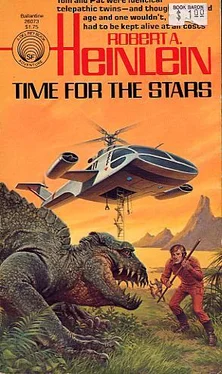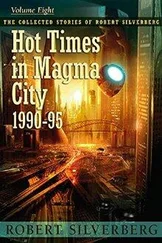Robert Heinlein - Time For The Stars
Здесь есть возможность читать онлайн «Robert Heinlein - Time For The Stars» весь текст электронной книги совершенно бесплатно (целиком полную версию без сокращений). В некоторых случаях можно слушать аудио, скачать через торрент в формате fb2 и присутствует краткое содержание. Жанр: Фантастика и фэнтези, на английском языке. Описание произведения, (предисловие) а так же отзывы посетителей доступны на портале библиотеки ЛибКат.
- Название:Time For The Stars
- Автор:
- Жанр:
- Год:неизвестен
- ISBN:нет данных
- Рейтинг книги:3 / 5. Голосов: 1
-
Избранное:Добавить в избранное
- Отзывы:
-
Ваша оценка:
- 60
- 1
- 2
- 3
- 4
- 5
Time For The Stars: краткое содержание, описание и аннотация
Предлагаем к чтению аннотацию, описание, краткое содержание или предисловие (зависит от того, что написал сам автор книги «Time For The Stars»). Если вы не нашли необходимую информацию о книге — напишите в комментариях, мы постараемся отыскать её.
Time For The Stars — читать онлайн бесплатно полную книгу (весь текст) целиком
Ниже представлен текст книги, разбитый по страницам. Система сохранения места последней прочитанной страницы, позволяет с удобством читать онлайн бесплатно книгу «Time For The Stars», без необходимости каждый раз заново искать на чём Вы остановились. Поставьте закладку, и сможете в любой момент перейти на страницу, на которой закончили чтение.
Интервал:
Закладка:
Dr. Mabel shivered. "What a terrible thought! There is too little privacy now."
I repeated this to Maudie (with Pat's interruptions and corrections) because the news services had found out what was going on in "Genetics Investigations" and naturally we "mind readers" came in for a lot of silly publicity and just as naturally, under Hedda Staley's mush-headed prodding, Maudie began to wonder if a girl had any privacy? She had, of course; I could not have read her mind with a search warrant, nor could Pat. She would have believed our simple statement if Hedda had not harped on it. She nearly managed to bust us up with Maudie, but we jettisoned her instead and we had threesome dates with Maudie until Pat was sent away.
But that wasn't until nearly the end of the summer after they explained Project Lebensraum.
About a week before our contract was to run out they gathered us twins together to talk to us. There had been hundreds that first day, dozens the second day, but just enough to crowd a big conference room by the end of summer. The redheads were among the survivors but Pat and I did not sit by them even though there was room; they still maintained their icicle attitude and were self-centered as oysters. The rest of us were all old friends by now.
A Mr. Howard was introduced as representing the Foundation. He ladled out the usual guff about being happy to meet us and appreciating the honor and so forth. Pat said to me. "Hang onto your wallet, Tom. This bloke is selling something." Now that we knew what we were doing Pat and I talked in the presence of other people even more than we used to. We no longer bothered to whisper since we had had proved to us that we weren't hearing the whispers. But we did subvocalize the words silently, as it helped in being understood. Early in the summer we had tried to do without words and read minds directly but it did not work. Oh, I could latch on to Pat, but the silly, incoherent rumbling that went on his mind in place of thought was confusing and annoying, as senseless as finding yourself inside another person's dream. So I learned not to listen unless he "spoke" to me and he did the same. When we did, we used words and sentences like anybody else. There was none of this fantastic, impossible popular nonsense about instantly grasping the contents of another person's mind; we simply "talked."
One thing that had bothered me was why Pat's telepathic "voice" sounded like his real one. It had not worried me when I did not know what we were doing, but once I realized that these "sounds" weren't sounds, it bothered me. I began to wonder if I was all there and for a week I could not "hear" him—psychosomatic telepathic-deafness Dr. Arnault called it.
She got me straightened out by explaining what hearing is. You don't hear with your ears, you hear with your brain; you don't see with your eyes, you see with your brain. When you touch something, the sensation is not in your finger, it is inside your head. The ears and eyes and fingers are just data collectors; it is the brain that abstracts order out of a chaos of data and gives it meaning. "A new baby does not really see," she said. "Watch the eyes of one and you can see that it doesn't. Its eyes work but its brain has not yet learned to see. But once the brain has acquired the habits of abstracting as 'seeing' and 'hearing,' the habit persists. How would you expect to 'hear' what your twin says to you telepathically? As little tinkling bells or dancing lights? Not at all. You expect words, your brain 'hears' words; it is a process it is used to and knows how to handle."
I no longer worried about it, I could hear Pat's voice clearer than I could hear the voice of the speaker addressing us. No doubt there were fifty other conversations around us, but I heard no one but Pat and it was obvious that the speaker could not hear anybody (and that he did not know much about telepathy) for he went on:
"Possibly a lot of you wonderful people—" (This with a sickening smile) "-are reading my mind right now. I hope not, or if you are I hope you will bear with me until I have said my say."
"What did I tell you?" Pat put in. "Don't sign anything until l check it."
("Shut up,'). I told him. ("I want to listen.") His voice used to sound like a whisper; now it tended to drown out real sounds. "
Mr. Howard went on, "Perhaps you have wondered why the Long Range Foundation has sponsored this research. The Foundation is always interested in anything which will add to human knowledge. But there is a much more important reason, a supremely important reason... and a grand purpose to which you yourselves can be supremely important."
"See? Be sure to count your change."
("Quiet, Pat.") , "Let me quote," Mr. Howard continued, "from the charter of the Long Range Foundation: 'Dedicated to the welfare of our descendants.' " He paused dramatically—I think that was what he intended; "Ladies and gentlemen, what one thing above all is necessary for our descendants?"
"Ancestors!" Pat answered promptly. For a second I thought that he had used his vocal cords, But nobody else noticed.
"There can be only one answer—living room! Room to grow, room to raise families, broad acres of fertile grain, room for parks and schools and homes. We have over five billion human souls on this planet; it was crowded to the point of marginal starvation more than a century ago with only half that number. Yet this afternoon there are a quarter of a million more of us than there were at this same hour yesterday
—ninety million more people each year. Only by monumental efforts of reclamation and conservation, plus population control measures that grow daily more difficult, have we been able to stave off starvation. We have placed a sea in the Sahara, we have melted the Greenland ice cap, we have watered the windy steppes, yet each year there is more and more pressure for more and more room for endlessly more people."
I don't care for orations and this was all old stuff. Shucks, Pat and I knew it if anyone did; we were the kittens that should have been drowned; our old man paid a yearly fine for our very existence.
"It has been a century since the inception of interplanetary travel; man has spread through the Solar System. One would think that nine planets would be ample for a race too fertile for one. Yet you all know that such has not been the case. Of the daughters of Father Sol only fair Terra is truly suited to Man."
"I'll bet he writes advertising slogans."
("Poor ones,") I agreed.
"Colonize the others we have done, but only at a great cost. The sturdy Dutch in pushing back the sea have not faced such grim and nearly hopeless tasks as the colonists of Mars and Venus and Ganymede. What the human race needs and must have are not these frozen or burning or airless discards of creation. We need more planets like this gentle one we are standing on. And there are more, many more!" He waved his hands at the ceiling and looked up.
"There are dozens, hundreds, thousands, countless hordes of them ... out there. Ladies and gentlemen, it is time for the stars!"
"Here comes the pitch," Pat said quietly. "A fast curve, breaking inside."
("Pat, what the deuce is he driving at?")
"He's a real estate agent."
Pat was not far off: but I am not going to quote the rest of Mr. Howard's speech. He was a good sort when we got to know him but he was dazzled by the sound of his own voice, so I'll summarize. He reminded us that the Torchship Avant-Garde had headed out to Proxima Centauri six years back. Pat and I knew about it not only from the news but because mother's brother, Uncle Steve, had put in for it—he was turned down, but for a while we enjoyed prestige just from being related to somebody on the list—I guess we gave the impression around school that Uncle Steve was certain to be chosen.
Читать дальшеИнтервал:
Закладка:
Похожие книги на «Time For The Stars»
Представляем Вашему вниманию похожие книги на «Time For The Stars» списком для выбора. Мы отобрали схожую по названию и смыслу литературу в надежде предоставить читателям больше вариантов отыскать новые, интересные, ещё непрочитанные произведения.
Обсуждение, отзывы о книге «Time For The Stars» и просто собственные мнения читателей. Оставьте ваши комментарии, напишите, что Вы думаете о произведении, его смысле или главных героях. Укажите что конкретно понравилось, а что нет, и почему Вы так считаете.












